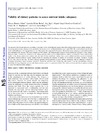Identificador persistente para citar o vincular este elemento:
https://accedacris.ulpgc.es/jspui/handle/10553/44759
| Título: | Validity of dietary patterns to assess nutrient intake adequacy | Autores/as: | Román-Viñas, Blanca Barba, Lourdes Ribas Ngo, Joy Martínez-González, Miguel Ángel Wijnhoven, Trudy M.A. Serra Majem, Luis |
Clasificación UNESCO: | 3206 Ciencias de la nutrición | Palabras clave: | Dietary Pattern Validity Micronutrients Adequacy Assessment |
Fecha de publicación: | 2009 | Publicación seriada: | British Journal of Nutrition | Resumen: | The purpose of the present study was to conduct a systematic review of the literature on the value of the methods used to assess dietary patterns for measuring nutrient intake adequacy in the population. Systematic review on Pubmed database up to April 2008. The search included specific key words and MeSH terms. No language limit was set. Only studies that compared food patterns with nutrient intake adequacy or nutrient biomarkers were included in the analysis. The search resulted in 1504 articles. The inclusion and exclusion criteria limited the selection to thirty articles. Nineteen studies evaluated the usefulness of the dietary patterns, either a priori defined (thirteen studies), or defined by factor analysis (four studies) or by cluster analysis (two studies), but only nine of them tested their validity (four a priori defined and four a posteriori defined). Diet indices showed moderate to good validity results for measuring the adequacy of intakes for alpha-carotene, beta-carotene, vitamin C, vitamin B-6, Ca, folic acid, Fe and Mg, The factor analysis approach showed moderate to good validity correlations with the adequacy of intake of alpha-carotene, beta-carotene, lutein, lycopene, vitamin C, vitamin B-6 and folic acid. Vitamin B-12 and vitamin E are the micronutrients with less probability of being adequately assessed with dietary patterns a priori or a posteriori defined. Diet indices are tools with fair to moderate validity to assess micronutrient intake adequacy. | URI: | https://accedacris.ulpgc.es/handle/10553/44759 | ISSN: | 0007-1145 | DOI: | 10.1017/S0007114509990547 | Fuente: | British Journal of Nutrition [ISSN 0007-1145], v. 101 (sup. 2), p. s12-s20, (Julio 2009) |
| Colección: | Artículos |
Citas SCOPUSTM
58
actualizado el 08-jun-2025
Citas de WEB OF SCIENCETM
Citations
53
actualizado el 15-feb-2026
Visitas
267
actualizado el 15-ene-2026
Descargas
234
actualizado el 15-ene-2026
Google ScholarTM
Verifica
Altmetric
Comparte
Exporta metadatos
Los elementos en ULPGC accedaCRIS están protegidos por derechos de autor con todos los derechos reservados, a menos que se indique lo contrario.
